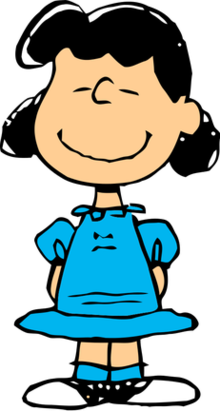
Peanuts is a syndicated daily and Sunday American comic strip written and illustrated by Charles M. Schulz. The strip's original run extended from 1950 to 2000, continuing in reruns afterward. Peanuts is among the most popular and influential in the history of comic strips, with 17,897 strips published in all, making it "arguably the longest story ever told by one human being" and is considered to be the grandfather of slice of life cartoons. At the time of Schulz's death in 2000, Peanuts ran in over 2,600 newspapers, with a readership of around 355 million in 75 countries, and was translated into 21 languages. It helped to cement the four-panel gag strip as the standard in the United States, and together with its merchandise earned Schulz more than $1 billion.
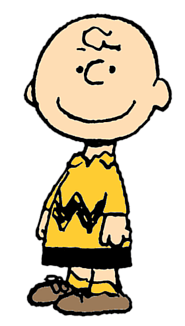
Charles "Charlie" Brown is the principal character of the comic strip Peanuts, syndicated in daily and Sunday newspapers in numerous countries all over the world. Depicted as a "lovable loser," Charlie Brown is one of the great American archetypes and a popular and widely recognized cartoon character. Charlie Brown is characterized as a person who frequently suffers, and as a result, is usually nervous and lacks self-confidence. He shows both pessimistic and optimistic attitudes: on some days, he is apprehensive to even go outside because his day might just be spoiled, but on others, he hopes for the best and tries as much as he can to accomplish things. He is easily recognized by his trademark zigzag patterned shirt.

It's the Great Pumpkin, Charlie Brown is a 1966 American animated Halloween television special based on the comic strip Peanuts by Charles M. Schulz. The third Peanuts special, and the second holiday-themed special, to be created, it was written by Schulz along with director/animator Bill Melendez and producer Lee Mendelson. The cast included Peter Robbins as Charlie Brown, Christopher Shea as Linus Van Pelt, Sally Dryer as Lucy Van Pelt, and Melendez as Snoopy. The special features music composed by jazz pianist Vince Guaraldi, whose contributions include the theme song "Linus and Lucy". It aired on broadcast television every year from its debut in 1966 until 2020 when it became an Apple TV+ exclusive.
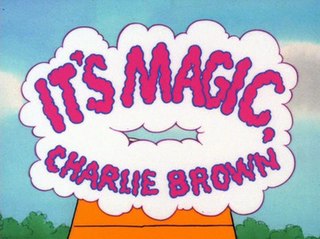
It's Magic, Charlie Brown is the 21st prime-time animated television special based upon the comic strip Peanuts, by Charles M. Schulz. It originally aired on April 28, 1981.

Linus Van Pelt is a fictional character in Charles M. Schulz’s comic strip Peanuts. He is the best friend of Charlie Brown, the younger brother of Lucy Van Pelt, and the older brother of Rerun Van Pelt. His first appearance was on September 19, 1952, but he was not mentioned by name until three days later. He was first referred two months earlier, on July 14. Linus spoke his first words in 1954, the same year he was first shown with his security blanket. Linus is named after Schulz's friend Linus Maurer.

Rerun Van Pelt is Linus and Lucy's younger brother in Charles M. Schulz's comic strip Peanuts. Lucy Van Pelt, his sister, disparagingly calls the situation a "rerun" of the birth of her brother Linus, so Linus nicknames the child "Rerun". Despite Lucy's disappointment, she becomes a warm and protective older sister.
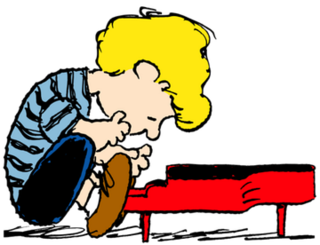
Schroeder is a fictional character in the long-running comic strip Peanuts, created by Charles M. Schulz. He is distinguished by his prodigious skill at playing the toy piano, as well as by his love of classical music in general and the composer Ludwig van Beethoven in particular. Schroeder is also the catcher on Charlie Brown's baseball team, though he is usually seen walking back to the pitcher's mound with the baseball, never throwing it—admitting in one strip he did not want the other team to discover his lack of ability. He is also the object of the unrequited infatuation of Lucy van Pelt, who constantly leans on Schroeder's piano. Charlie Brown, Frieda, Peppermint Patty, and Snoopy are occasionally depicted leaning on Schroeder's piano.
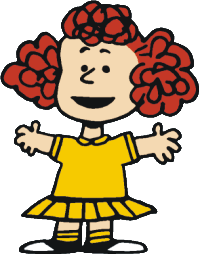
Frieda is a fictional character in the comic strip Peanuts by Charles Schulz. She is known for having naturally curly hair, of which she is extremely proud.

Snoopy, Come Home! is a 1972 American animated musical comedy-drama film directed by Bill Melendez and written by Charles M. Schulz based on the Peanuts comic strip. The film marks the on-screen debut of Woodstock, who had first appeared in the strip in 1967. It was the only Peanuts film during composer Vince Guaraldi’s lifetime that did not have a score composed by him. Its music was composed by the Sherman Brothers, who composed the music for various Disney films like Mary Poppins (1964), The Jungle Book (1967), and Bedknobs and Broomsticks (1971). The film was released on August 9, 1972 by National General Corporation, produced by Lee Mendelson Films, Bill Melendez Productions and Cinema Center Films. Despite receiving largely positive reviews, the film was a box-office flop, grossing only $245,073 against a production budget of over $1 million.

It's Arbor Day, Charlie Brown is the 15th prime-time animated television special based on Charles M. Schulz's comic strip Peanuts. The subject of the special is Arbor Day, a secular holiday devoted to planting trees. It's Arbor Day, Charlie Brown premiered on the CBS network on March 16, 1976, which is near the dates in which most U.S. states observe Arbor Day. This is the first special to feature the character Rerun van Pelt, who had debuted in the Peanuts comic strip in March 1973.

It's Your First Kiss, Charlie Brown is the 16th prime-time animated television special based on the comic strip Peanuts by Charles M. Schulz. It was originally aired 8:00 PM, Monday, October 24, 1977, on the CBS-TV network. In this special, Charlie Brown worries when he is chosen to kiss his crush in a homecoming parade.

A Charlie Brown Celebration is the 23rd prime-time animated television special based upon the popular comic strip Peanuts, by Charles M. Schulz, who appears in a live-action prologue, and the first hour-long special. It was originally aired on the CBS network on May 24, 1982, and consists of a number of stories adapted from the comic strip.

Is This Goodbye, Charlie Brown? is the 24th prime-time animated television special based upon the comic strip Peanuts, by Charles M. Schulz. It was originally aired on the CBS network on February 21, 1983. In the special, Charlie Brown tries to cope with learning that Linus and Lucy are moving away. The special is adapted from a storyline from the comic strip that lasted from May 9 to May 21, 1966.

A Charlie Brown Valentine is the 40th animated television special based on characters from the Charles M. Schulz comic strip Peanuts. It features the Peanuts characters during the week leading up to Valentine's Day. It is the second Valentine's Day-themed Peanuts special, following Be My Valentine, Charlie Brown (1975).

You're in the Super Bowl, Charlie Brown is the 37th prime-time animated television special based on Charles M. Schulz's comic strip Peanuts. It premiered on January 18, 1994 on NBC. It was the last new Peanuts special to air on television until A Charlie Brown Valentine in 2002, and the last before Schulz's death in 2000.

You're a Good Man, Charlie Brown is the 29th prime-time animated musical television special based upon the comic strip Peanuts, by Charles M. Schulz. This adaptation of the 1967 musical You're a Good Man, Charlie Brown originally aired on the CBS network on November 6, 1985, and rebroadcast on June 14, 1988. The special was produced by Charles M. Schulz Creative Associates and Mendelson-Melendez Productions.
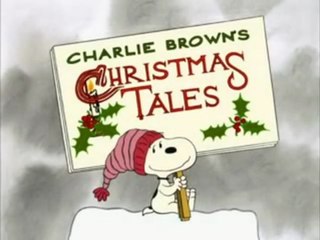
Charlie Brown's Christmas Tales is the 41st prime-time animated TV special based on characters from the Charles M. Schulz comic strip Peanuts. It originally aired on ABC December 8, 2002. It was thereafter broadcast each Christmas season after that through to 2019 as a companion segment in an hour-long slot featuring an unedited version of A Charlie Brown Christmas.
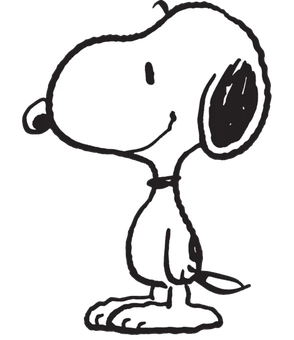
Snoopy is an anthropomorphic beagle in the comic strip Peanuts by Charles M. Schulz. He can also be found in all of the Peanuts films and television specials. Since his debut on October 4, 1950, Snoopy has become one of the most recognizable and iconic characters in the comic strip and is considered more famous than Charlie Brown in some countries. The original drawings of Snoopy were inspired by Spike, one of Schulz's childhood dogs.

Happiness Is a Warm Blanket, Charlie Brown is the 45th Peanuts animated television special, released in 2011. It was the final primetime special based on the comic strip, before the franchise moved to Apple TV in 2020. The special is the first one produced without Bill Melendez on the production team, following his death in 2008. It is also the first special without the direct involvement of Peanuts creator Charles M. Schulz, Lee Mendelson Productions or Bill Melendez Productions. In addition, it is the first Peanuts special produced in part under Warner Bros. Television, which holds the home media distribution rights to the Peanuts specials.
